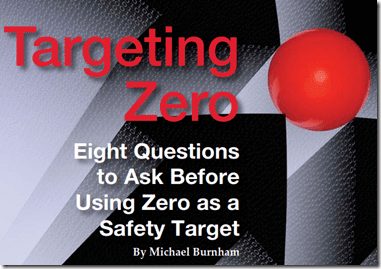WANTED: Non-marketing success stories and articles about the positives of zero harm targets and programs………
Full credit to the ASSE for daring to publish an article like this – very mature, progressive and refreshing – you impressed and motivated a lot of people!
Important Stuff To Think About Before Setting Zero Goals
 I can almost hear the groans, yawns and cries of “so how many people do you want to hurt” even before I’ve hit “publish” on this post. For pretty good reasons this blog has been accused of focussing way too much on Zero Harm. Along with some of the other authors, I’ve been called as absolutist as the pro zero harm zealots themselves. Only yesterday I was called one of the “Anti Zero Cult Leaders”. I get all that and accept it and understand why people think that way. What I also need to reiterate is that I’ve offered equal air time to the Zero Proponents, provoked them, challenged them, begged them………but nothing, except hate mail.
I can almost hear the groans, yawns and cries of “so how many people do you want to hurt” even before I’ve hit “publish” on this post. For pretty good reasons this blog has been accused of focussing way too much on Zero Harm. Along with some of the other authors, I’ve been called as absolutist as the pro zero harm zealots themselves. Only yesterday I was called one of the “Anti Zero Cult Leaders”. I get all that and accept it and understand why people think that way. What I also need to reiterate is that I’ve offered equal air time to the Zero Proponents, provoked them, challenged them, begged them………but nothing, except hate mail.
 Like it or not, the illogical and unachievable strive for perfectionism has become a major component of safety in the last few years, particularly for the Tier1’s and their suppliers who must comply or else. We can’t just have it both ways and say: “don’t worry about it, its just an aspirational goal” and then get on with real safety and running a business in the hope it goes away without having any negative impact. It won’t – there is way too much sunk cost! It’s now even started to evolve (or should that be devolve) into “beyond perfect” and “perfection plus" mantras. I am still looking for an example of a zero harm company that has a real, mature and positive organisational culture – not just in it’s marketing material?
Like it or not, the illogical and unachievable strive for perfectionism has become a major component of safety in the last few years, particularly for the Tier1’s and their suppliers who must comply or else. We can’t just have it both ways and say: “don’t worry about it, its just an aspirational goal” and then get on with real safety and running a business in the hope it goes away without having any negative impact. It won’t – there is way too much sunk cost! It’s now even started to evolve (or should that be devolve) into “beyond perfect” and “perfection plus" mantras. I am still looking for an example of a zero harm company that has a real, mature and positive organisational culture – not just in it’s marketing material?
I did set a goal to achieve zero zero harm posts but I failed, so now I know how zero zealots feel. But I have a great excuse because I have found an article that I really thought had to be shared and read by all safety people, regardless of your zero beliefs. I promise I will learn from this failure, let zero go for a while and talk about something else as recommended at the end of the article.
The peer-reviewed article was recently published by ASSE in their professional safety magazine. Its titled “Eight Questions to Ask Before Using Zero as a Safety Target”. It was written by Michael Burnham, CSP, who is not a member of our “cult” but a Safety Director at Riggs Distler and Co, a utility company in NJ, USA. I won’t steal all Michael’s thunder but this is a very quick summary of his eight important points (please try to read the whole article before sending me more hate mail). Full credit to the ASSE for daring to publish an article like this – very mature, progressive and refreshing – you impressed a lot of people!
DOWNLOAD ARTICLE HERE: Targeting Zero
Extract of intro: Great golfers do not set a target of making 18 eagles per round. Great hitters do not set a goal of batting 1.000 over a full baseball season…….standards of absolute perfection are not part of the professional sports landscape…….Zero injury targets are easy to communicate and seem to be everywhere. However, such targets can be counter productive to a company’s safety efforts if the context in which they are used is not thoroughly examined. Therefore before setting zero as a safety target, a company should ask eight important questions:
1 – How well will zero as a target motivate employees?
When goals are perceived as too hard to reach, employee motivation is not increased. True motivation is ascribed to achievement, recognition, and the work itself, not to goals.
2 – What is the organisations true purpose?
Safety cannot be an organisations only priority because every organisation has another reason for being.
3 – To what extent is the company willing to support perfection?
Unlimited resources must be available, every potential risk or hazard must be addressed, a score of 99/100 on training exams is unacceptable.
4 – How can the company control all the factors that contribute to injuries?
There are times when people do exactly as directed and are still injured – consider 3rd parties, sub-contractors, other conflicting systems, the environment, problems at home, black swan events (you cannot predict what you have never experienced)…….. all the things we just cannot control
5 – What cognitive limitations make people susceptible to error, even in the best management systems?
Consider peoples biases and illusions of attention, memory, confidence, knowledge, cause and potential.
6 – How could zero as a target undermine the ability to lead?
Leadership requires bonds of loyalty and commitment. When a leader sets a zero target and achieves it all is well. If not then it exposes a leader who communicated a vision that is not being realised.
7 – How could zero as a target hinder the organisations ability to learn?
Targets of zero discourages incident reporting. Focussing on the end result ignores the complexities along the way. We learn best by making mistakes. Mastery comes from deliberate practice, fear of mistakes does not encourage people to take on tasks.
8 – Instead of zero, what approaches can a company focus on to achieve better results?
Rather than struggling vainly to exercise direct control over incidents and accidents, managers should regularly measure and improve the processes of training, communication, maintenance, planning etc. Instead of talking about zero, talk about something else. These conversations may be the first steps toward an improved culture which may then even lead to zero injuries!
DOWNLOAD ARTICLE HERE: Targeting Zero
Thoughts and comments that lead to a professional and open minded debate are very welcome, I especially want to hear from people who disagree with the points in the article and why


Do you have any thoughts? Please share them below